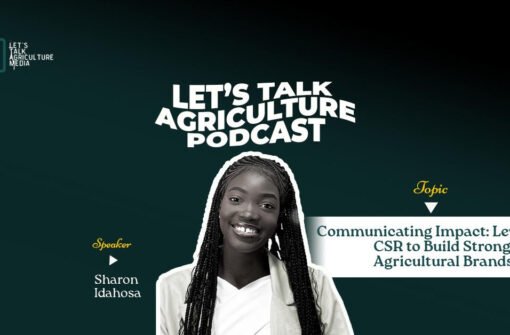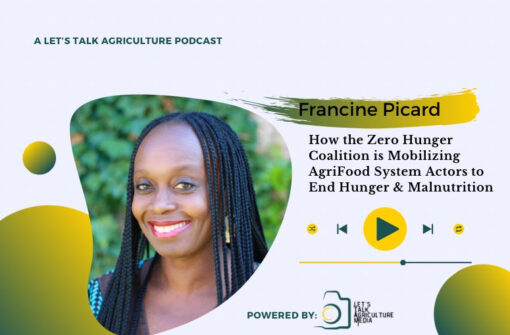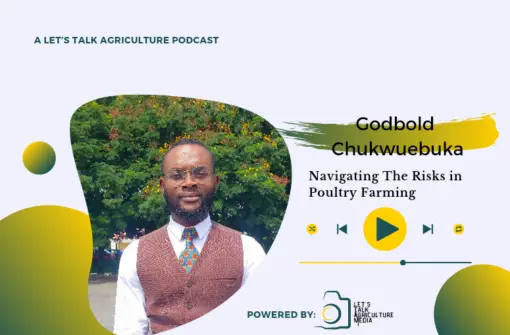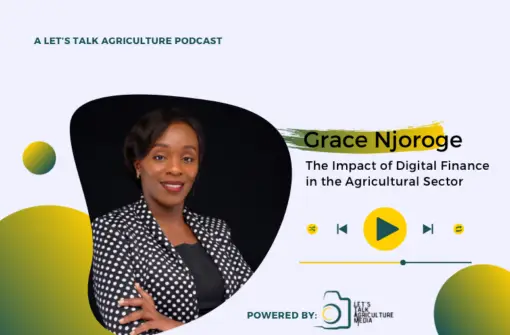Regenerative Agriculture: Empowering Farmers for a Sustainable Future with Tania Roa
Welcome to another episode of our sustainability series where our podcast host, Sharon Idahosa had a seat with Tania Roa of Sustainable Harvest International to discuss how they are empowering farmers to transition into regenerative agriculture practices.
Transcript
[00:00:00] Sharon Idahosa: Hello, beautiful people. Welcome to another episode of the Sustainability Series brought to you by Let’s Talk Agriculture. So we are an industry specific public relations and communications firm specializing in agriculture. So just in case you haven’t explored our website to see what we have in store for you, quickly visit letstalkagriculture.com for more information.
[00:00:25] Sharon Idahosa: So our previous sustainability series featured a phenomenal woman who joined us to, you know, how she’s leading the change in the Cassava Valley chain and the industry at large. Today we want to dive into another interesting episode, digging deep into regenerative agriculture.
[00:00:44] Sharon Idahosa: Now the question, how can we empower farmers for a sustainable future? So, join me, welcome Tania Roa, the climate justice and wildlife advocate at Sustainable Harvest International. Hello, Tanya. How are you doing today? Thank you so much for joining the show.
[00:01:01] Tania Roa: Great. Thank you so much. I’m so glad I get to talk today about Sustainable Harvest International’s work.
[00:01:07] Tania Roa: Um, it’s going to be really exciting. I’m just glad to be here.
[00:01:10] Sharon Idahosa: Great. Hopefully just relax. I mean, it’s It’s not just gonna be a stressful thing to just relax and let’s just try to enjoy ourselves basically. So I’d like to know a little bit about you because I haven’t really seen so much about you. So maybe you can tell us just a little bit about you, what you experience as a climate justice and wildlife advocate.
[00:01:32] Tania Roa: Sure. So right now, I’m the communications and outreach coordinator at Sustainable Harvest International. And with Sustainable Harvest International, we’re working with family farmers in Central America, um, who are transitioning to regenerative agriculture. A lot of them grew up learning conventional agriculture.
[00:01:51] Tania Roa: It’s just the default practice that they learned, which includes burning forests and then growing crops, um, in that burned land, but that just leads to a lot of health effects, uh, for them and for the planet. Of course, we don’t want to burn forests. And so, What we do is just help them learn a new way of agriculture; regenerative agriculture that we’ll be talking about.
[00:02:14] Tania Roa: And so my part in that role is just sharing their stories as a communications coordinator. And it’s just really exciting to see how they can really transform their lives with just a new, what seems very simple, a new practice, um, but really a profound and transformational way to better their lives and better.
[00:02:38] Tania Roa: the environment that they live in.
[00:02:40] Sharon Idahosa: Thank you for sharing that. So, I think it’s really important that we try to create awareness around, um, climate change because so many people are still focused on burning and I really don’t know who gave them the idea. I mean, I see this often. I just can’t help but wonder why are you burning?
[00:03:00] Sharon Idahosa: And the most annoying part of it is, yeah, it’s annoying to me really because they do this during the dry season when everywhere is dry and then you start burning. What are you burning really? What? You see dust flying everywhere. And it’s, it’s just, it just makes the whole environment messy. And I mean, you can’t really breathe in such air or something.
[00:03:25] Sharon Idahosa: So, I think it’s really amazing. Um, what you’re doing and also helping them to, you know, change the way they have been operating over time. Hopefully we can get more people to do this because people just have a particular mindset already that this is how it should be done. And I really don’t know who said we should be gone and done.
[00:03:46] Sharon Idahosa: But, I mean, I think everybody just grew up with that mindset or something because it’s still happening even when we continue preaching about climate change and the rest. So it’s really important that we [00:04:00] come out and start at, um, advocating and pushing out for this so people know that there is really no need for us to be doing the whole burning thing.
[00:04:08] Sharon Idahosa: So good work that you’re doing, communicating what you guys are doing at Sustainable Harvest. So well done.
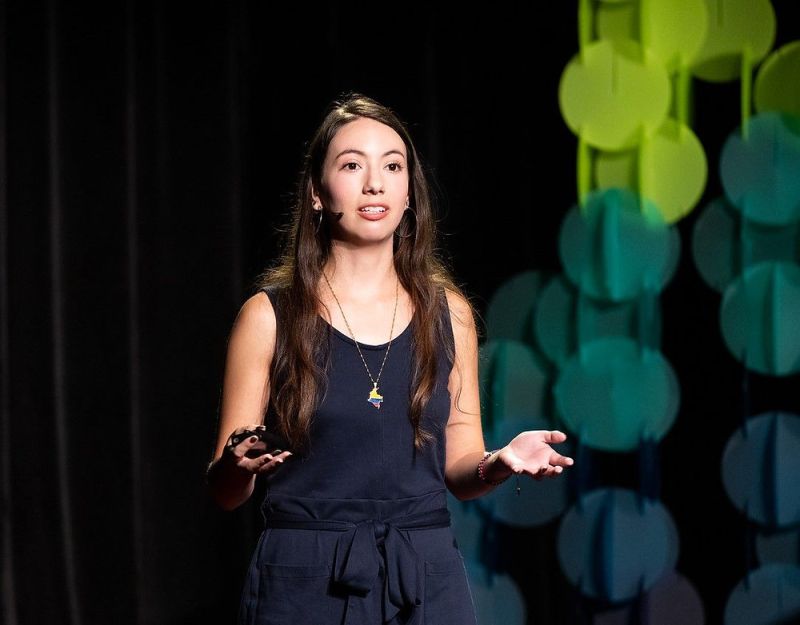
[00:04:15] Tania Roa: Thank you so much. Yeah, I totally agree. It’s tragic and it’s ironic that That’s the practice a lot of people learned because it really doesn’t work for anyone. I mean, conventional agriculture, because you’re burning the land, eventually, you’re just going to strip the soil away from everything you need to grow crops.
[00:04:34] Tania Roa: So it’s just ironic because they’re learning a practice that isn’t sustainable. It isn’t going to last very long. They can’t pass it down to their kids. And then that’s why people have to go burn more forests eventually when the soil isn’t producing food. So it’s really horrible because it’s a cycle that continues, right?
[00:04:51] Tania Roa: Unless we, um, intervene and use a new practice.
[00:04:55] Sharon Idahosa: Indeed. I definitely agree with that. But then again, what are some of the challenges you’ve faced so far? I mean, in terms of promoting regenerative agriculture. Having been able to, you know, address these challenges.
[00:05:09] Tania Roa: Yeah, so it’s different with the different audiences that we have, with the farmers directly that we work with, uh, just teaching them a new practice.
[00:05:18] Tania Roa: It requires that they are willing to learn a new practice, right? So we have to come into the community and Really set ourselves up as someone who wants to help them. They, you know, at first may be wary, like, why are you coming into my community? And we have local field trainers, but sometimes even then they’re not sure, Oh, is this actually going to work?
[00:05:37] Tania Roa: Of course. And they have every right to worry because they’re farmers. And so their livelihoods are on the line and their families and their nutrition are on the line. So they really have to be skeptical at first. And we do have practices to help them meet other farmers who are already in the program, who have already learned regenerative agriculture, so that they can feel better of wanting to join the program.
[00:06:00] Tania Roa: So at first there is a bit of, Hmm, I don’t know if I should try this. I don’t know if this is for me. And so we really do have to talk with them and discuss what we do. And so in that aspect, it is, It’s a mindset change. If you use a new practice, you really have to be willing to do that. And, um, when it comes to consumers, uh, worldwide, our supporters worldwide, there’s a different aspect that we have to address when it comes to how we promote what we do, because we want people everywhere to learn about regenerative agriculture, even if they’re not in the countries that we have programs in.
[00:06:34] Tania Roa: And for them, what we see is sometimes they may not Understand the connections between climate and food, and I think a lot of it is because we’re just so used to going to the grocery store and in a lot of places and getting things that are prepackaged that are already cut for you. You really learn, um, or you really, yeah, lose the connection between the person buying the food and the farmer and agriculture and what did it take for that food to get to that grocery store to get to your house?
[00:07:05] Tania Roa: So I think with that disconnection, it’s hard to, people realize, Oh, I should care about how this food is grown because all you go to the grocery store and see, Oh, there’s food like everything’s fine.
[00:07:15] Tania Roa: But we know that that’s not true. Um, once we go out to the rural areas, So showing people actually what we do and sharing their stories, that’s why I think sharing the farmer stories is so important. So, people can feel like, oh, even though I’m over here in a completely different place, maybe a different country, what these farmers are doing matters to me because I care about how food is grown everywhere.
[00:07:36] Sharon Idahosa: Thank you for sharing that. I mean, I totally understand. Um, it’s very difficult to, you know, try to change. the mindsets of, of farmers, of people generally, actually. I mean, because I’ve been, um, taught this or I’ve learned this, I’ve been doing this for, for, I mean, over the years and all of a sudden you’re telling me something different, which of course I’m supposed to use this [00:08:00] to feed myself, my family and the rest.
[00:08:02] Sharon Idahosa: And all of a sudden, you’re telling me to change it. So, it’s really, um, going to be a challenge. I mean, just take a look at some of the innovative solutions, Agri-tech solutions that are coming into, into the picture. It’s very difficult for farmers to, you know, um, adopt these technologies. I mean, because this is not new to them.
[00:08:26] Sharon Idahosa: So, getting them involved, creating awareness, speaking to them more about it would definitely help them to, you know, change their mindsets. It should definitely help them. And of course, I do think that, um, it’s really important that we try to also know where our food is coming from. I’m really excited about, I mean, I, I think I had a particular episode on agritourism.
[00:08:50] Sharon Idahosa: Uh, it helps us to, you know, learn more about where our food is coming from, help us to have that real connection with the, local farmers, the local producers. So, you doing that, I think it’s really amazing. And that way we can still promote the work of local farmers in the rural communities as well. So well done with what you’re doing and how you’re connecting and helping farmers to spread their message.
[00:09:14] Sharon Idahosa: It’s really important.
[00:09:16] Tania Roa: Thank you. Thank you so much. And I have to listen to that episode. Uh, I agree. That’s so important that we all learn and I’m, I’m still learning. I’m, I’m guilty of it too, of sometimes forgetting all the work and care it takes to get food on my plate. It’s, it is a lot of work. Um, so we have our farmers to think for.
[00:09:35] Sharon Idahosa: Yes. I mean,
[00:09:36] Tania Roa: our farmers worldwide, of course.
[00:09:39] Sharon Idahosa: Indeed. I think that if we, if we’re able to connect with them, we’ll definitely be able to appreciate the work that they put in. I mean, the smallholder farmers contribute greatly to the agricultural sector. I mean, I think about 70 percent or 80 percent of the food that we eat, and then they don’t get the, um, they don’t get what they need to continue producing.
[00:10:02] Sharon Idahosa: And of course, women farmers as well. So I think if we get to connect with them, It’s, it would be a lot more easier to appreciate their work and, um, really want to support them. But if you’re just from a distance, you wouldn’t see the work that they put in, and in producing the food that you see. So I’ll definitely, I mean, that episode, I was actually encouraging people to say, hey, try as much as possible to check out agritourism, because I think it’s really going to help a lot.
[00:10:35] Sharon Idahosa: It is really going to help us to get connected to the farmers and appreciate farmers more. So maybe you should really check out that episode and share it with your community as well. So more people would see that it’s very important that we try to connect with farmers to really appreciate the work that they do on the farm and for us as well; the consumers.
[00:10:55] Tania Roa: Yes, definitely will. I love that you also brought up women farmers. We’ve been talking a lot about how that comes into play because we do work with a lot of women and there we do see, um, with women farmers, it’s a whole new set of challenges, right? If they even have, a say in their household. And most of you work with women who do.
[00:11:17] Tania Roa: And in some places that might not be the case, sadly. So, there are a lot of gender roles that come into play in agriculture. Unfortunately, that means that women farmers may not always get as much access or as much resources as men will. And so that’s an important part of, agriculture in general as well; the human aspect.
[00:11:37] Tania Roa: Um, I mean, farmers can’t even do their work if they don’t have land, if they don’t have resources, if they don’t have the money to even start their farm. So, I think that’s why just supporting farmers, especially farmers who will not have access to all of those things. If you wouldn’t support them, um, usually family farmers, usually small holder farmers.
[00:11:58] Tania Roa: Yeah, and especially women.
[00:11:59] Sharon Idahosa: [00:12:00] Well, yeah, I believe that in terms of getting access to finance, because I, I see that as a major challenge for women. I’m not sure about your region, but I know that it is a major challenge for women here. And, um, from one of my previous episodes, I discussed with some of the Uh, an amazing woman, of course, who is also playing a very vital role in the agriculture space and connecting with women as well.
[00:12:25] Sharon Idahosa: And I think one of the key thing that they did was to meet up with the financial institutions, um, to see how to create the right. I mean, to be intentional about creating, um, products that will be favorable to women. So it’s not just about, um, drafting, um, policies and stuff that would, wouldn’t even favor women because sometimes most of their, um, um, policies, to get, to get access to, to the finance loans and stuff, they require that, Hey, you’re going to have to bring your husband to, you know, um, get access to this loan at the end of the day, the, the, the money doesn’t belong to the woman anymore because the husband is now in control of the woman, of the money, meaning that she wouldn’t get as much as.
[00:13:12] Sharon Idahosa: She needs to, to, um, build agriculture business or increase, um, production on the farm. So, these are challenges that women go through and if we try to implement this, maybe you can try to implement this in your region as well. The financial institutions, the government should create, um, favorable policies or something that can benefit women.
[00:13:41] Sharon Idahosa: If you’re drafting out a plan for women to get access to, to loans, to, to, to finance. I mean, generally, I mean, you should be able to make it tailored to them, not adding something external factors or something that would still be a limiting factor for them. So, I really loved that episode because it really just, um, hit the nail on the head.
[00:14:04] Sharon Idahosa: So that’s also another episode for, for us to share so that more financial institutions, the government, They would really get a, a, a direction on how to go about making loans, um, grants, available for, for the farmers. So, so yes, maybe you should, um, try to implement that as well in your region. I think it’s really going to be amazing if that can really work out.
[00:14:28] Tania Roa: Yeah, of course. It’s great how we can learn from each other, no matter where we are. I think that is the beauty of agriculture and generative agriculture. These are great practices that can be used no matter where you are. And so learning, um, just what other people are doing in other parts of the world can apply to you and apply to your circumstances if you just kind of tailor it to that.
[00:14:52] Tania Roa: So definitely, um, these are just great episodes. So thank you so much.
[00:14:57] Sharon Idahosa: It’s definitely my pleasure. I mean, I’m very particular about the growth of the agricultural sector. So, and of course the farmers. So, I try as much as possible to still share my insights or maybe, um, conversations from previous episodes to make sure that it is fully packed.
[00:15:16] Sharon Idahosa: And the farmers, the agripreneurs that are listening to this episode will really benefit from both sides as well. So yes, thank you so much once again for the work that you are doing.
[00:15:29] Tania Roa: Oh, thank you. It really is something our whole team is passionate about. And that includes the field trainers to people like me are kind of in the behind the scenes if you will.
[00:15:40] Tania Roa: We’re not working directly with the farmers, but we’re also, we are supporting them in some way. And so, there are a lot of ways to support farmers and regenerative agriculture. You don’t necessarily have to be planting food if you don’t have the land or space for it. I know in my case, that’s, that’s the issue.
[00:15:55] Tania Roa: Um, in my personal case, and so it is nice. that no matter what [00:16:00] your circumstance is, if you can’t exactly grow food right now, you can at least support someone who’s already doing that by buying food from them or by just supporting them in a different way. So, this really is something, um, globally that we are seeing more, more farmers are transitioning to regenerative agriculture, but I do think they need that support because, I mean, it’s just like any other market.
[00:16:21] Tania Roa: If, if they will have the people who are willing to buy the food from them. They’re not going to be able to grow any more food. So, the movement towards regenerative agriculture.
[00:16:31] Sharon Idahosa: Thank you so much. Yes. So, um, just maybe before we round up to just briefly just share shed light on regenerative agriculture practices.
[00:16:43] Sharon Idahosa: And what are some of the things that, um, the farmers should look out for if they’re trying to transition?
[00:16:50] Tania Roa: Of course. So conventional agriculture, which is the kind of agriculture that we say, um, our farmers learn first by default. And specifically, where we work in central America, which is full of tropical forests, they learn slash and burn agriculture, which is kind of, it’s very descriptive, um, slash and burn, you slash the trees and you burn the land.
[00:17:13] Tania Roa: And so regenerative is quite the opposite. And specifically what we use is agroforestry and Sustainable Harvest International uses that because we want to plant those trees again. And so with agroforestry, it’s a type of regenerative agriculture that it’s actually in the name agroagriculture forestry forestry and so you combine forest management with farming and with that you include when you’re planning your farm you include trees inside and around your farm and it really just helps with everything that you’re already doing anyways um so if you need to restore your soil these are a great way to help do that because it helps the soil stick When storms come, it reduces soil erosion and trees also just with climate change, extreme heat and drought and dry seasons that becomes more and more needed.
[00:18:06] Tania Roa: And they also just help continue the water cycle that’s already natural but may have been lost when all those trees were burned down and slashed. And so ,you’re really just bringing back the forest that was lost. there before and that was functioning well, but that may not be anymore. Now that the land has been really degraded and disturbed.
[00:18:26] Tania Roa: And so regenerative agriculture as a framework really calls for you to restore the soil in a way that, um, increases soil organic matter and topsoil. And these are really needed to grow crops without topsoil and without organic matter you just really can’t have an abundant harvest and, or a nutritious one, um, we’re also seeing that these tend to be more healthy because you have more nutrients in the soil that can go into your food.
[00:18:56] Tania Roa: And so, it really is just beneficial for everybody. It’s beneficial for the people eating that food, it’s beneficial for the land and the soil. And so, um, Sustainable Harvest International is very, very intentional about including trees. and restoring the soil. And so, you’re restoring the ecosystem that was there before the forest ecosystem.
[00:19:16] Sharon Idahosa: Thank you for sharing that. I think that’s pretty, um, straightforward and very clear for those that are trying to, um, transition into regenerative agriculture, or let’s even call it agroforestry. So, thank you so much for sharing your insights and thank you once again for joining the Let’s Talk Agriculture podcast show.
[00:19:36] Sharon Idahosa: I mean, this is, this is, this is home for agriculture stakeholders to, you know, come get knowledge, come get opportunities and to also share the expertise as well. So, thank you for joining the show to share about the work that you do and your contribution generally. So, thank you once again.
[00:19:55] Tania Roa: Oh, thank you so much.
[00:19:57] Tania Roa: I love this conversation. It’s always great to talk [00:20:00] about. climate solutions. I think sometimes we can feel really, uh, overwhelmed, right? With everything that’s going on in the world and how can we help with climate change and regenerative agriculture is a climate solution that is proven to work. It’s proven to restore ecosystems and help with climate change.
[00:20:18] Tania Roa: So, love talking about it. Love talking about Sustainable Harvest Internationals work. So, thank you so much.
[00:20:24] Sharon Idahosa: It’s a pleasure. So guys, we have come to the end of today’s episode. I really hope. That you learned something from this episode. I hope that you get to practice this because I mean, we need, we need a world where everybody can, you know, just be happy.
[00:20:41] Sharon Idahosa: I really don’t want anything to happen to me myself. So,
[00:20:45] Sharon Idahosa: so please guys, if you’re burning, I really don’t think you should burn anymore. I wouldn’t want to, I wouldn’t want to fall sick. So please guys. Let’s try to adopt this
[00:20:59] Sharon Idahosa: method of, um, agriculture. I mean, it’s really, it’s really amazing. Just plant trees.
[00:21:04] Sharon Idahosa: I mean, let’s, let’s go back to the way it was. Every time you see so many people, um, falling down trees, burning and stuff, I mean, it’s really not nice. You can’t, you can’t feel it anymore. Sometimes you hear people saying, Well, I went to the village, it doesn’t feel like village anymore. Because they’ve cut down the trees, houses everywhere, it’s no longer feeling like it used to.
[00:21:26] Sharon Idahosa: Uh, uh, uh, crops are no longer looking the way they used to. And some of the existing crops that we had, they’ve just, they’ve just all gone extinct because they’ve been removed and it’s just crazy. So, I mean, in, in, in the next few years, I wonder what we’re going to have. What are the nutritious food that we are going to have? that to say, Hey, this is what we have, this is what we are eating.
[00:21:49] Sharon Idahosa: I really don’t know anymore, but I hope that some of this will help to change these, um, challenges that we already face. So, once again, thank you for your contribution and thank you for your work. Once again, guys, we have come to the end of today’s episode. Don’t mind me, I talk too much, but we have come to the end of today’s episode.
[00:22:10] Sharon Idahosa: I hope that you really learned from this. I think we had a previous podcast episode on agroforestry before. So, you can still combine both and see how best it can help you as a farmer, as an entrepreneur looking to transition into generative agriculture. So, guys do well to explore, letstalkagriculture.com.
[00:22:31] Sharon Idahosa: If you have questions, if you have, um, a particular challenge or a particular topic that you’d like us to cover, please do well to send an email to podcast@letstalkagriculture.com. So, take care, I’m your host, Sharon Idaohsa. Cheers!!!
End of Transcript

